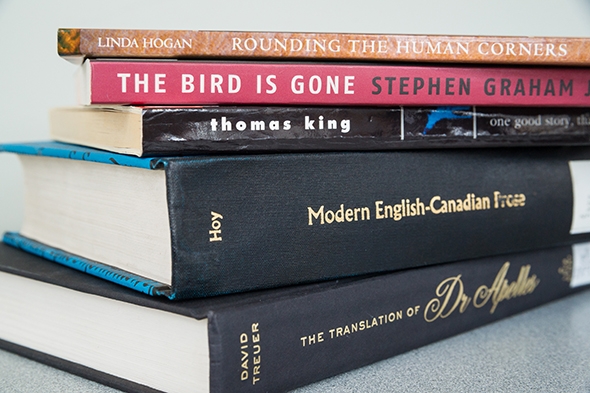As Associate Professor Melanie Benson Taylor was helping line up speakers for a Native American studies event in April, she had a realization.
“I noticed how many of the speakers are authors on my syllabus for my spring term course,” says Benson Taylor, who teaches Native American literature this term. “It’s amazing. The impact that will have on students is extraordinary.”

As part of the 40th anniversary of the Native American Studies Program at Dartmouth, four Native American writers and a scholar of Native writing will take part in a panel discussion next week. Linda Hogan, Helen Hoy, Stephen Graham Jones, Thomas King, and David Treuer will participate in a discussion titled, “Telling Lives: Native American Writing in the 21st Century.” The panel, free and open to the public, begins at 4 p.m. on April 5 in Moore Hall’s Filene Auditorium. There will be a book signing afterward.
“This is a great event to look back and celebrate our 40th anniversary, which is remarkable, but also to look forward into 21st-century Native literature,” says Senior Lecturer of Native American Studies Vera Palmer, who helped organize the event.
The speakers will also meet with faculty at a luncheon, visit classes, and have dinner with students.
“I am tremendously excited about the symposium because we will be hearing from some of the greatest writers in Native American literature of our time,” says David Cordero ’16, who is taking Benson Taylor’s Native American literature course.
“I’m curious to know how well the authors’ intentions match our interpretations of their works,” says Betsy Winkle ’15, who is enrolled in the same class.
Benson Taylor hopes the speakers will inspire students.
“Students need models of what artists can look like,” says Benson Taylor. “I can’t think of five writers who are better embodiments.”
In 1972, Dartmouth established one of the nation’s first Native American studies programs. At the time, there were about 20 Native students at Dartmouth. In 2012, 155 undergraduates at Dartmouth identified themselves as Native Americans.
The 40th anniversary celebration featured a lecture last fall from noted legal scholars as well as upcoming events, including an exhibit about the founding of the Native American Studies Program in Baker-Berry Library.
Palmer is looking forward to seeing the literary luminaries interact.
“The writers bring a wide range of expression, certainly on the page, but I would also suggest a wide range of creative perspective,” says Palmer. “I think it’s terrific to have so many different insights.”
The event is sponsored by the Ed and Molly Scheu Fund in Native American studies and the Office of the President.
Speaker biographies:
- Linda Hogan (Chickasaw) is the award-winning author of numerous works of fiction, nonfiction, and poetry, including the Pulitzer Prize-nominated poetry collection, Rounding the Human Corners. She serves as writer-in-residence for the Chickasaw Nation. Her many accolades include a Guggenheim Fellowship, a Colorado Book Award, and a National Endowment for the Arts Fellowship.
- Helen Hoy, professor emeritus at the University of Guelph, in Ontario, Canada, has written articles and books on Canadian literature, including in her most recent book, How Should I Read These? Native Women Writers in Canada. In addition, she has collaborated on several articles and books with her partner, Thomas King.
- Stephen Graham Jones (Blackfeet) is a professor of English at the University of Colorado, Boulder. The author of seven books, Jones has won the Texas Institute of Letters Award for Fiction and the Independent Publishers Multicultural Award. He has been a National Endowment for the Arts Fellow. Some of his writing falls into the genres of horror, science, and experimental fiction.
- Thomas King (Cherokee), professor emeritus at the University of Guelph, has written several novels including Medicine River, Green Grass Running Water, and Truth and Bright Water. In 2003, he was the first person of Native descent to give the Massey Lectures, a prestigious weeklong series of talks in Canada.
- David Treuer (Ojibwe) has written several books including novels Little, The Hiawatha, and The Translation of Dr. Apelles, which was named a Best Book of the Year by The Washington Post. In addition, Truer has won a Pushcart Prize and the 1996 Minnesota Book Award. A professor of English at the University of Southern California, Treuer’s essays and stories have appeared in Esquire, The Washington Post, and the Los Angeles Times.
